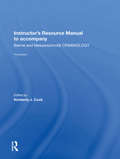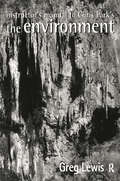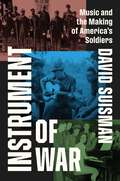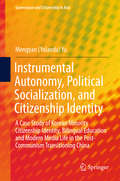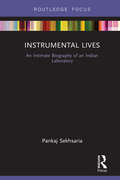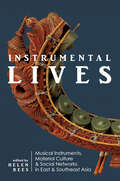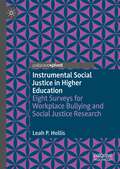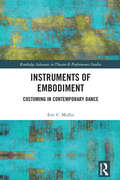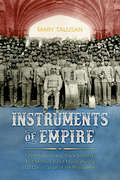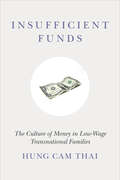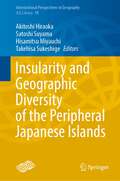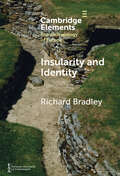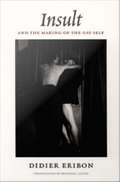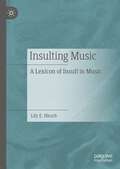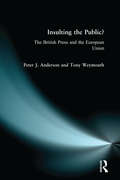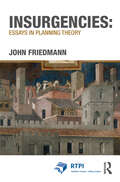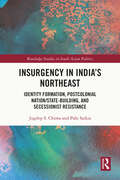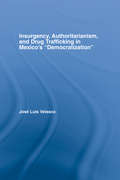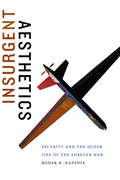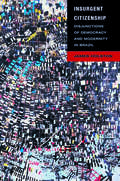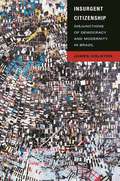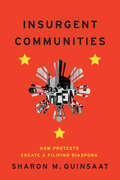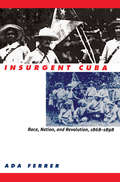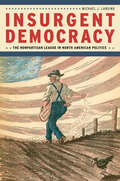- Table View
- List View
Instructor's Manual To Accompany Criminology
by Kimberly CookThe goal of this resource manual is to help students understand crime, the origins of criminological theory, the emergence of sociological criminology and the subcultures of delinquency. It also provides information on the different types of crimes that exist.
Instructor's Manual to Chris Park's The Environment
by Greg LewisThe very survival of the planet is at risk: human misuse of natural resources and disturbance of natural environmental systems is pushing the Earth to the limits of its capacity. The Environment is a lively, comprehensive introduction for environmental study, explaining how the environment functions, how environmental systems relate, and the ways in which people and environment interact. Focussing particularly on the environmental impacts of human activities, the book explains the ways in which an understanding of basic physical principles can help us to use the environment and its resources. Three particular approaches are adopted throughout: * a systems approach - highlighting the interactions and interrelationships between the environment's diverse parts * an interdisciplinary perspective - stepping back from individual subject focus to examine the complex breadth of the environment's diversity * a global perspective - incorporating stimulating examples drawn from around the world to illustrate broad global patterns and contrasts. The Environment explains the principles and applications of the different parts of the Earth's system: the lithosphere, the atmosphere, the hydrosphere, and explains the interrelationship across these systems. It explores the present environmental crisis, examines how the planet Earth fits into the wider universe, and explores human-environment interactions, to offer a clear understanding of the diverse and complex environment we live in and new ways of thinking about the way it is changing. Specific features include: * Lively, stimulating and accessible text * Superb illustrations: 4-colour plate sections * Case studies drawn from around the world, boxed within the text * Chapter summaries * Annotated further reading lists A Lecturer's Manual is available to accompany the text
Instrument of War: Music and the Making of America's Soldiers
by David SuismanAn original history of music in the lives of American soldiers. Since the Civil War, music has coursed through the United States military. Soldiers have sung while marching, listened to phonographs and armed forces radio, and packed the seats at large-scale USO shows. “Reveille” has roused soldiers in the morning and “Taps” has marked the end of a long day. Whether the sounds came from brass instruments, weary and homesick singers, or a pair of heavily used earbuds, where there was war, there was music, too. Instrument of War is a first-of-its-kind study of music in the lives of American soldiers. Although musical activity has been part of war since time immemorial, the significance of the US military as a musical institution has generally gone unnoticed. Historian David Suisman traces how the US military used—and continues to use—music to train soldiers and regulate military life, and how soldiers themselves have turned to music to cope with war’s emotional and psychological realities. Opening our ears to these practices, Suisman reveals how music has enabled more than a century and a half of American war-making. Instrument of War unsettles assumptions about music as a force of uplift and beauty, demonstrating how it has also been entangled in large-scale state violence. Whether it involves chanting “Sound off!” in basic training, switching on a phonograph or radio, or cueing up an iPod playlist while out on patrol, the sound of music has long resonated in soldiers’ wartime experiences. Now we all can finally hear it.
Instrumental Autonomy, Political Socialization, and Citizenship Identity
by Mengyan Yolanda YuThis book offers essential insights into Chinese Korean minority youth citizenship identity development during their high school and university education period out of their political socialization experience. It investigates how they develop their citizenship identity with the state through bilingual education and media exposure, as an outcome of the entangled relationship between state power and economic globalization. The book demonstrates to readers how to apply the abstract conceptual framework of identity politics and ideology construction, nurtured by both civil culture and political evolvement, to a specific case with operationalized measurement extracted from political socialization concepts so as to understand and rationalize identity development. This approach offers both an in-depth way to penetrate further in the discourse construction that shapes identity politics and an innovative means of measuring and explaining relevant relationships.
Instrumental Lives: An Intimate Biography of an Indian Laboratory (Routledge Focus on Modern Subjects)
by Pankaj SekhsariaInstrumental Lives is an account of instrument making at the cutting edge of contemporary science and technology in a modern Indian scientific laboratory. For a period of roughly two-and-half decades, starting the late 1980s, a research group headed by CV Dharmadhikari in the physics department at the Savitribai Phule University, Pune, fabricated a range of scanning tunnelling and scanning force microscopes including the earliest such microscopes made in the country. Not only were these instruments made entirely in-house, research done using them was published in the world's leading peer reviewed journals, and students who made and trained on them went on to become top class scientists in premier institutions. The book uses qualitative research methods such as open-ended interviews, historical analysis and laboratory ethnography that are standard in Science and Technology Studies (STS), to present the micro-details of this instrument making enterprise, the counter-intuitive methods employed, and the unexpected material, human and intellectual resources that were mobilised in the process. It locates scientific research and innovation within the social, political and cultural context of a laboratory's physical location and asks important questions of the dominant narratives of innovation that remain fixated on quantitative metrics of publishing, patenting and generating commerce. The book is a story as much of the lives of instruments and their deaths as it is of the instrumentalities that make those lives possible and allow them to live on, even if with a rather precarious existence.
Instrumental Lives: Musical Instruments, Material Culture, and Social Networks in East and Southeast Asia
by Helen Rees Jennifer C. Post Bell Yung Terauchi Naoko Tyler Yamin Maire-Pierre Lissoir Insee AdlerThe musical instruments of East and Southeast Asia enjoy increasing recognition as parts of humanity’s intangible cultural heritage. Helen Rees edits a collection that offers vibrant new ways to link these objects to their materials of manufacture, the surrounding environment, the social networks they form and help sustain, and the wider ethnic or national imagination. Rees organizes the essays to reflect three angles of inquiry. The first section explores the characteristics and social roles of various categories of instruments, including the koto and an extinct Balinese wooden clapper. In section two, essayists focus on the life stories of individual instruments ranging from an heirloom Chinese qin to end-blown flutes in rural western Mongolia. Essays in the third section examine the ethics and other issues that surround instrument collections, but also show how collecting is a dynamic process that transforms an instrument’s habitat and social roles. Original and expert, Instrumental Lives brings a new understanding of how musical instruments interact with their environments and societies. Contributors: Supeena Insee Adler, Marie-Pierre Lissoir, Terauchi Naoko, Jennifer C. Post, Helen Rees, Xiao Mei, Tyler Yamin, and Bell Yung
Instrumental Social Justice in Higher Education: Eight Surveys for Workplace Bullying and Social Justice Research
by Leah P. HollisThis book offers eight validated instruments on workplace bullying to support robust mixed methods approaches for social justice research. Workplace bullying is an excellent starting point from which scholars can consider social justice research. The data shows that marginalized and disenfranchised groups (minoritized groups, women, junior faculty, and the LGBTQ+ community) are disproportionately affected. The outcomes included career interruption and severe health disparities. Though there is a demand for workplace bullying instruments, the book also lays a foundation for creating surveys to address these populations more effectively.
Instruments of Embodiment: Costuming in Contemporary Dance (Routledge Advances in Theatre & Performance Studies)
by Eric MullisInstruments of Embodiment draws on fashion theory and the philosophy of embodiment to investigate costuming in contemporary dance. It weaves together philosophical theory and artistic practice by closely analyzing acclaimed works by contemporary choreographers, considering interviews with costume designers, and engaging in practice-as-research. Topics discussed include the historical evolution of contemporary dance costuming, Merce Cunningham’s innovative collaborations with Robert Rauschenberg, and costumes used in Ohad Naharin’s Virus (2001) and in a ground-breaking Butoh solo by Tatsumi Hijikata. The relationship between dance costuming and high fashion, wearable computing, and the role costume plays in dance reconstruction are also discussed and, along the way, an anarchist materialism is articulated which takes an egalitarian view of artistic collaboration and holds that experimental costume designs facilitate new forms of embodied experience and ways of seeing the body. This study will be of great interest to students and scholars working in performance philosophy, philosophy of embodiment, dance and performance studies, and fashion theory.
Instruments of Empire: Filipino Musicians, Black Soldiers, and Military Band Music during US Colonization of the Philippines
by Mary TalusanAt the turn of the twentieth century, the United States extended its empire into the Philippines while subjugating Black Americans in the Jim Crow South. And yet, one of the most popular musical acts was a band of “little brown men,” Filipino musicians led by an African American conductor playing European and American music. The Philippine Constabulary Band and Lt. Walter H. Loving entertained thousands in concert halls and world’s fairs, held a place of honor in William Howard Taft’s presidential parade, and garnered praise by bandmaster John Philip Sousa—all the while facing beliefs and policies that Filipinos and African Americans were “uncivilized.” Author Mary Talusan draws on hundreds of newspaper accounts and exclusive interviews with band members and their descendants to compose the story from the band’s own voices. She sounds out the meanings of Americans’ responses to the band and identifies a desire to mitigate racial and cultural anxieties during an era of overseas expansion and increasing immigration of nonwhites, and the growing “threat” of ragtime with its roots in Black culture. The spectacle of the band, its performance and promotion, emphasized a racial stereotype of Filipinos as “natural musicians” and the beneficiaries of benevolent assimilation and colonial tutelage. Unable to fit Loving’s leadership of the band into this narrative, newspapers dodged and erased his identity as a Black American officer. The untold story of the Philippine Constabulary Band offers a unique opportunity to examine the limits and porousness of America’s racial ideologies, exploring musical pleasure at the intersection of Euro-American cultural hegemony, racialization, and US colonization of the Philippines.
Insufficient Funds: The Culture of Money in Low-Wage Transnational Families
by Hung Cam ThaiEvery year migrants across the globe send more than $500 billion to relatives in their home countries, and this circulation of money has important personal, cultural, and emotional implications for the immigrants and their family members alike. Insufficient Funds tells the story of how low-wage Vietnamese immigrants in the United States and their poor, non-migrant family members give, receive, and spend money. Drawing on interviews and fieldwork with more than one hundred members of transnational families, Hung Cam Thai examines how and why immigrants, who largely earn low wages as hairdressers, cleaners, and other "invisible" workers, send home a substantial portion of their earnings, as well as spend lavishly on relatives during return trips. Extending beyond mere altruism, this spending is motivated by complex social obligations and the desire to gain self-worth despite their limited economic opportunities in the United States. At the same time, such remittances raise expectations for standards of living, producing a cascade effect that monetizes family relationships. Insufficient Funds powerfully illuminates these and other contradictions associated with money and its new meanings in an increasingly transnational world.
Insularity and Geographic Diversity of the Peripheral Japanese Islands (International Perspectives in Geography #18)
by Akitoshi Hiraoka Satoshi Suyama Hisamitsu Miyauchi Takehisa SukeshigeThis book clarifies the geography of the peripheral Japanese islands from a variety of angles. The islands are distributed in the tropical and cool temperate zones, and the most distant inhabited islands are more than 1,000 km from the mainland. In the past, they were Japan's frontier, close to neighboring countries. However, during Japan's modernization process, the islands were positioned as backward regions, supplying food, resources, and labor. Today, the islands are considered to be on the periphery of Japan, with lifestyles different from those of the mainland. The islands are also getting attention as sightseeing locales and emigration regions attracting those who prefer country life—an image of the islands that has been created by the romanticized gaze from the Japanese mainland. The authors describe the various forms of the outlying Japanese islands and at the same time discover their common regional characteristics, as defined by the view from the mainland.
Insularity and Identity: Prehistoric Britain and the Archaeology of Europe (Elements in the Archaeology of Europe)
by Richard BradleyThe Element considers historiography – the extent to which insular prehistorians have integrated their findings with the archaeology of mainland Europe; and the ways in which Continental scholars have drawn on British material. An important theme is the cultural and political relationship between this island and the mainland. The other component is an up-to-date account of prehistoric Britain and her neighbours from the Mesolithic period to the Iron Age, organised around the seaways that connected these regions. It emphasises the links between separate parts of this island and different parts of the Continent. It considers the links across the Irish Sea as only one manifestation of a wider process and treats Ireland on the same terms as other accessible regions, from France to the Low Countries. It shows how different parts of Britain were separate from one another and how they can be studied in a European framework.
Insult and the Making of the Gay Self
by Didier EribonA bestseller in France following its publication in 1999, Insult and the Making of the Gay Self is an extraordinary set of reflections on "the gay question" by Didier Eribon, one of France's foremost public intellectuals. Known internationally as the author of a pathbreaking biography of Michel Foucault, Eribon is a leading voice in French gay studies. In explorations of gay subjectivity as it is lived now and as it has been expressed in literary history and in the life and work of Foucault, Eribon argues that gay male politics, social life, and culture are transformative responses to an oppressive social order. Bringing together the work of Jean-Paul Sartre, Pierre Bourdieu, Judith Butler, and Erving Goffman, he contends that gay culture and political movements flow from the need to overcome a world of insult in the process of creating gay selves. Eribon describes the emergence of homosexual literature in Britain and France at the turn of the last century and traces this new gay discourse from Oscar Wilde and the literary circles of late-Victorian Oxford to Andr Gide and Marcel Proust. He asserts that Foucault should be placed in a long line of authors--including Wilde, Gide, and Proust--who from the nineteenth century onward have tried to create spaces in which to resist subjection and reformulate oneself. Drawing on his unrivaled knowledge of Foucault's oeuvre, Eribon presents a masterful new interpretation of Foucault. He calls attention to a particular passage from Madness and Civilization that has never been translated into English. Written some fifteen years before The History of Sexuality, this passage seems to contradict Foucault's famous idea that homosexuality was a late-nineteenth-century construction. Including an argument for the use of Hannah Arendt's thought in gay rights advocacy, Insult and the Making of the Gay Self is an impassioned call for critical, active engagement with the question of how gay life is shaped both from without and within.
Insulting Music: A Lexicon of Insult in Music
by Lily E. HirschInsulting Music explores insult in and around music and demonstrates that insult is a key dimension of Western musical experience and practice. There is insult in the music we hear, how we express our musical preferences, as well as our reactions to settings and sites of music and music making. More than that, when music and insult overlap, the effects can both promote social justice or undermine it, foster connection or break it apart. The coming together of music and insult shapes our sense of self and view of other people, underlining and constructing difference, often in terms of race and gender. In the last decade, music’s power dynamics have become an increasingly important concern for music scholars, critics, and fans. Studying musicians such as Frank Zappa, Nickleback, Taylor Swift, and the Insane Clown Posse, and musical phenomena such as musician jokes, the use of music to torture people, and the playing of music in restaurants, this book shows the various and contradictory ways insults are used to negotiate those existing dynamics in and around music.
Insulting the Public?: The British Press and the European Union
by Tony Weymouth Peter J. AndersonInsulting the Public? examines the way in which the European Union and issues relating to it are represented to the public. Combining theoretical and empirical research, the text explores and provides an assessment of the performance of the British Press in its representation of the European Union in the period immediately preceding the General Election of 1997 and during the British presidency of the Union from January to June 1998.
Insurance Economics
by Peter Zweifel Roland EisenInsurance Economics brings together the economic analysis of decision making under risk, risk management and demand for insurance by individuals and corporations, objectives pursued and management tools used by insurance companies, the regulation of insurance, and the division of labor between private and social insurance. Appropriete both for advanced undergraduate and graduate students of economics, management, and finance, this text provides the background required to understand current research. Predictions derived from theoretical argument are not only stated but confronted with empirical evidence. Throughout the book, conclusions summarize results, helping readers to check their knowledge and understanding. Issues discussed include paradoxa in decision making under risk, selection of favorable risks by insurers, the possibility of a "death spiral" in insurance markets, and future challenges such as re-regulation in the wake of the 2007-09 financial crisis and the increasing availability of generic information.
Insurgencies: Essays in Planning Theory (RTPI Library Series)
by John FriedmannFor nearly fifty years John Friedmann's writings have not just led the academic study of the discipline, but have given shape and direction to the planning profession itself. Covering transactive planning, radical planning, the concept of the Good City, civil society, rethinking poverty and the diversity of planning cultures, this collection of Friedmann's most important and influential essays tells a coherent and compelling story about how the evolution of thinking about planning over several decades has helped to shape its practice. With each essay given a new introduction to establish its context and importance, this is an ideal text for the study of planning theory and history.
Insurgency in India's Northeast: Identity Formation, Postcolonial Nation/State-Building, and Secessionist Resistance (Routledge Studies in South Asian Politics)
by Jugdep S. Chima Pahi SaikiaInsurgency in India’s Northeast provides a systematic analysis of every major secessionist group and insurgency in the region within a unified and original explanatory framework, focusing primarily on the postcolonial period. This book presents a parsimonious analytic narrative involving a rich sequential account of the historical evolution of Mizo, Naga, Meitei, and "ethnic Assamese" identities from precolonial to colonial to postcolonial times. Avoiding essentialist or primordialist arguments, the chapters in the book demonstrate how ethnic/(sub)national identities are dynamic and malleable phenomenon, not immutable natural givens. In particular, it argues that the postcolonial Indian state has attempted to integrate these ethnic/sub-state national groups into the Indian Union through a combination of democratic accommodation/consociationalism and hegemonic/violent control, strategically designed to encapsulate their evolving (sub) national identities into the overarching state-sponsored Indian nationality. Through this book, readers will gain a rich understanding of the dynamics of ethnicity/ nationality and the nation/state-building process in postcolonial India. It will be of interest to researchers in the fields of Asian studies, ethnicity, nationalism, separatism, security studies, border studies, and international relations.
Insurgency, Authoritarianism, and Drug Trafficking in Mexico's Democratization
by Jose L. VelascoMexico's "democratic transition" has created a competitive electoral system and a formally plural state. Besides, a peculiar wave of insurgency, started in 1994, has challenged the alleged moderating effect of democratic transition. This book argues that socioeconomic inequality is the main factor behind this combination of democratic and undemocratic trends.
Insurgent Aesthetics: Security and the Queer Life of the Forever War (Art History Publication Initiative)
by Ronak K. KapadiaIn Insurgent Aesthetics Ronak K. Kapadia theorizes the world-making power of contemporary art responses to US militarism in the Greater Middle East. He traces how new forms of remote killing, torture, confinement, and surveillance have created a distinctive post-9/11 infrastructure of racialized state violence. Linking these new forms of violence to the history of American imperialism and conquest, Kapadia shows how Arab, Muslim, and South Asian diasporic multimedia artists force a reckoning with the US war on terror's violent destruction and its impacts on immigrant and refugee communities. Drawing on an eclectic range of visual, installation, and performance works, Kapadia reveals queer feminist decolonial critiques of the US security state that visualize subjugated histories of US militarism and make palpable what he terms &“the sensorial life of empire.&” In this way, these artists forge new aesthetic and social alliances that sustain critical opposition to the global war machine and create alternative ways of knowing and feeling beyond the forever war.
Insurgent Citizenship: Disjunctions Of Democracy And Modernity In Brazil (In-formation Ser.)
by James Holston<P>Insurgent citizenships have arisen in cities around the world. <P>This book examines the insurgence of democratic citizenship in the urban peripheries of São Paulo, Brazil, its entanglement with entrenched systems of inequality, and its contradiction in violence.<P> James Holston argues that for two centuries Brazilians have practiced a type of citizenship all too common among nation-states--one that is universally inclusive in national membership and massively inegalitarian in distributing rights and in its legalization of social differences.<P> But since the 1970s, he shows, residents of Brazil's urban peripheries have formulated a new citizenship that is destabilizing the old.<P> Their mobilizations have developed not primarily through struggles of labor but through those of the city--particularly illegal residence, house building, and land conflict. <P>Yet precisely as Brazilians democratized urban space and achieved political democracy, violence, injustice, and impunity increased dramatically.<P> Based on comparative, ethnographic, and historical research, Insurgent Citizenship reveals why the insurgent and the entrenched remain dangerously conjoined as new kinds of citizens expand democracy even as new forms of violence and exclusion erode it.<P> Rather than view this paradox as evidence of democratic failure and urban chaos, Insurgent Citizenship argues that contradictory realizations of citizenship characterize all democracies--emerging and established. <P>Focusing on processes of city- and citizen-making now prevalent globally, it develops new approaches for understanding the contemporary course of democratic citizenship in societies of vastly different cultures and histories.
Insurgent Citizenship: Disjunctions of Democracy and Modernity in Brazil (In-Formation)
by James HolstonInsurgent citizenships have arisen in cities around the world. This book examines the insurgence of democratic citizenship in the urban peripheries of São Paulo, Brazil, its entanglement with entrenched systems of inequality, and its contradiction in violence. James Holston argues that for two centuries Brazilians have practiced a type of citizenship all too common among nation-states--one that is universally inclusive in national membership and massively inegalitarian in distributing rights and in its legalization of social differences. But since the 1970s, he shows, residents of Brazil's urban peripheries have formulated a new citizenship that is destabilizing the old. Their mobilizations have developed not primarily through struggles of labor but through those of the city--particularly illegal residence, house building, and land conflict. Yet precisely as Brazilians democratized urban space and achieved political democracy, violence, injustice, and impunity increased dramatically. Based on comparative, ethnographic, and historical research, Insurgent Citizenship reveals why the insurgent and the entrenched remain dangerously conjoined as new kinds of citizens expand democracy even as new forms of violence and exclusion erode it. Rather than view this paradox as evidence of democratic failure and urban chaos, Insurgent Citizenship argues that contradictory realizations of citizenship characterize all democracies--emerging and established. Focusing on processes of city- and citizen-making now prevalent globally, it develops new approaches for understanding the contemporary course of democratic citizenship in societies of vastly different cultures and histories.
Insurgent Communities: How Protests Create a Filipino Diaspora
by Sharon M. QuinsaatSociologist Sharon M. Quinsaat sheds new light on the formation of diasporic connections through transnational protests. When people migrate and settle in other countries, do they automatically form a diaspora? In Insurgent Communities, Sharon M. Quinsaat explains the dynamic process through which a diaspora is strategically constructed. Quinsaat looks to Filipinos in the United States and the Netherlands—examining their resistance against the dictatorship of Ferdinand Marcos, their mobilization for migrants’ rights, and the construction of a collective memory of the Marcos regime—to argue that diasporas emerge through political activism. Social movements provide an essential space for addressing migrants’ diverse experiences and relationships with their homeland and its history. A significant contribution to the interdisciplinary field of migration and social movements studies, Insurgent Communities illuminates how people develop collective identities in times of social upheaval.
Insurgent Cuba
by Ada FerrerIn the late nineteenth century, in an age of ascendant racism and imperial expansion, there emerged in Cuba a movement that unified black, mulatto, and white men in an attack on Europe's oldest empire, with the goal of creating a nation explicitly defined as antiracist. This book tells the story of the thirty-year unfolding and undoing of that movement. Ada Ferrer examines the participation of black and mulatto Cubans in nationalist insurgency from 1868, when a slaveholder began the revolution by freeing his slaves, until the intervention of racially segregated American forces in 1898. In so doing, she uncovers the struggles over the boundaries of citizenship and nationality that their participation brought to the fore, and she shows that even as black participation helped sustain the movement ideologically and militarily, it simultaneously prompted accusations of race war and fed the forces of counterinsurgency.Carefully examining the tensions between racism and antiracism contained within Cuban nationalism, Ferrer paints a dynamic portrait of a movement built upon the coexistence of an ideology of racial fraternity and the persistence of presumptions of hierarchy.
Insurgent Democracy: The Nonpartisan League in North American Politics
by Michael J. LansingIn 1915, western farmers mounted one of the most significant challenges to party politics America has seen: the Nonpartisan League, which sought to empower citizens and restrain corporate influence. Before its collapse in the 1920s, the League counted over 250,000 paying members, spread to thirteen states and two Canadian provinces, controlled North Dakota's state government, and birthed new farmer-labor alliances. Yet today it is all but forgotten, neglected even by scholars. Michael J. Lansing aims to change that. Insurgent Democracy offers a new look at the Nonpartisan League and a new way to understand its rise and fall in the United States and Canada. Lansing argues that, rather than a spasm of populist rage that inevitably burned itself out, the story of the League is in fact an instructive example of how popular movements can create lasting change. Depicting the League as a transnational response to economic inequity, Lansing not only resurrects its story of citizen activism, but also allows us to see its potential to inform contemporary movements.
